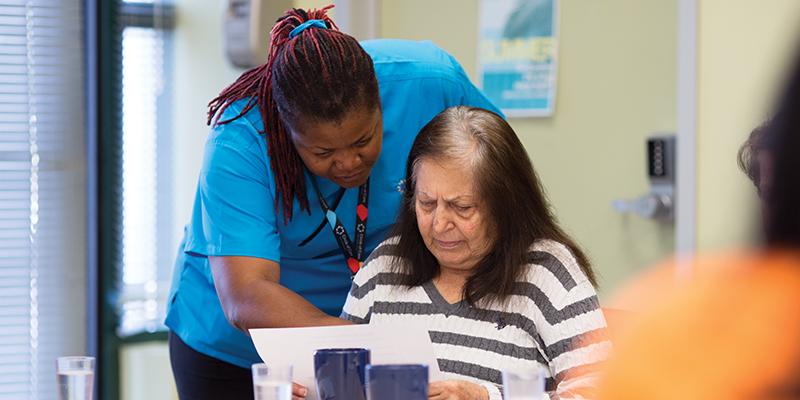
 Above: MT outside Circle of Care's Day Centre in Vaughan
Above: MT outside Circle of Care's Day Centre in Vaughan
Written By: Heidi Singer
Photos By: John Packman
Dementia slipped into JT’s life slowly. First it was forgetfulness, common enough among people in their 70s. Then getting lost while driving familiar routes. Sometimes she’d become paranoid, thinking a friend took her jewellery. Later, she’d stare listlessly at anything on TV, even columns of stock prices.
For a time, MT (JT’s husband of 60 years) found relief at the Circle of Care Adult Day Program (ADP), which offers evidence-based support for people with dementia, including cognitive, physical, emotional, spiritual and social programming. The program also gave him time to meet friends for coffee and take care of his own health needs. But then, JT was hospitalized for other medical reasons, and hospital staff decided that because of her health issues, she needed emergency placement in a nursing home.
However, MT quickly realized his wife was not ready for long-term care. “After three weeks, she was broken and so was I,” he says. Suffering terrible guilt, he showed up at the home one day and packed her things. MT had been in touch with an ADP social worker for support and help, so the decision to bring her back to the program was natural. Ever since, she has been home with him in North York, and spends two days a week at the ADP, part of Sinai Health System.
“She is blooming,” says MT, an 82-year old retired engineer, who believes the return to a familiar environment explains the improvement. “I saw my wife dancing at the Day Centre Hanukkah party. When we meet friends, she can joke around — she doesn’t just sit. She changes channels on the TV looking for things that attract her. When I come to pick her up, and I see a smile on her face, I know she’s doing well.”

Above: JT attending the Adult Day Program at Circle of Care.
The Adult Day Program hosts up to 37 people with dementia each day in its light-filled rooms on Steeles Avenue in Vaughan. With its pretty green walls, comfortable chairs, and mix of clients and staff chatting over coffee, the space is cheerful and busy. A typical day might include discussions of current events and history, card games or bingo, seated exercises for balance, games to sharpen the mind, bowling, challah baking, manicures for the ladies, and lots of music. Even people who have lost the ability to speak can sometimes sing — especially the Friday Shabbat prayers enjoyed by both Jewish and non-Jewish clients.
The Circle of Care ADP has been operating for close to eight years, helping to keep people with dementia at home for as long as possible, providing the stimulation that helps their cognition and offering a much-needed break for their caregivers.
“Programs like ours are life-altering for families because we enable them to cope. The Day Program might be the only time they can shop for groceries or meet a friend for lunch.”
- Madeline D’Arpino, Registered Nurse
“A major goal of our program is to support the caregivers with the burden of care,” says manager Ethel Kaiserman. “ They are free to take care of their needs when their loved one is cared for by our staff and they feel free to come to our social workers and our nurse to ask questions. We also have support groups for them to be able to attend and gain from sharing with others. They find this place a haven.”
As people live longer with complex conditions affecting both mind and body, health providers are increasingly realizing they help people most when they also support those caring for them. It’s tough for MT to find the time and energy to care for himself. Sometimes he despairs. It feels like “you’re married to a body, not a person. You want to spend your golden years in a better condition.”
An avid photographer, MT hasn’t picked up a camera in several years. He used to love reading, but struggled to maintain attention with a wife who needed constant supervision. Recently, he ran out to the store briefly and returned to find an ambulance in front of his house and neighbours on their porches — his wife had wandered outside and fallen, breaking her wrist. His children live in other countries or work long hours, and many friendships have faded as his wife’s dementia advanced.
“A major goal of our program is to support the caregivers with the burden of care. They are free to take care of their needs when their loved one is cared for by our staff… we also have support groups for them. They find this place a haven.”
- Ethel Kaiserman, Manager, Adult Day Program, Circle of Care
Encouraged by the social workers, he joined a support group for spouses of ADP clients where he learned new ways of relating to his wife. Now, when she asks if her parents are still alive, he doesn’t get as upset. He understands it’s not helpful to reason her out of thinking that an 80-year old might still have living parents. In the group, he befriended two other spouses and meets them regularly to share experiences — their own private support group.
“We talk nonsense sometimes,” he says, “but we have each other.”
Caring for someone with dementia is harrowing, says Circle of Care Social Worker Tessa Wassyng. “Some of the ways we support the caregivers, both on a day-to-day basis and in the groups, is helping them through behaviours they find challenging and helping them to negotiate and navigate our very complicated health-care and long-term care systems.”
In an informal Circle of Care survey, all 30 respondents said the ADP helped to keep their loved ones home longer. Most thought it helped improve the symptoms of dementia.
“Programs like ours are life-altering for families because we enable them to cope,” says Madeline D’Arpino, Circle of Care’s on-site Registered Nurse.“ The ADP might be the only time they can shop for groceries or meet a friend for lunch. There’s the woman who drops her husband off every Friday and gets her hair and makeup done — an important morale boost, and a reminder to herself that she matters too; or the artist who was able to start painting again.”
“She is blooming. When I come to pick her up and I see a smile on her face, I know she’s doing well.”
- MT, Husband and caregiver
Since its inception, the program has served increasingly older and frailer clients with more physical ailments (the average age is late 80s, including a sizeable number of Holocaust survivors). D’Arpino sees this as a positive sign because it shows that people with dementia are living more of their lives outside of nursing homes. The average client stays at least a year, until their dementia makes it too difficult to keep them at home.
“I know with dementia, there’s only one way to go,” MT says. Seeing his wife’s improvement, “I asked if there’s some possibility of reversal. I was told to enjoy it as long as possible.”
However, there is no question in his mind that the ADP is right for his wife, who is much more cheerful and outgoing since she entered the program. “It looks like she’s at peace,” he observes. This has improved his quality of life as well. He has been able to read more, and would never have predicted a year ago that he could travel with her to Israel, as he did recently to visit his son and grandchildren.